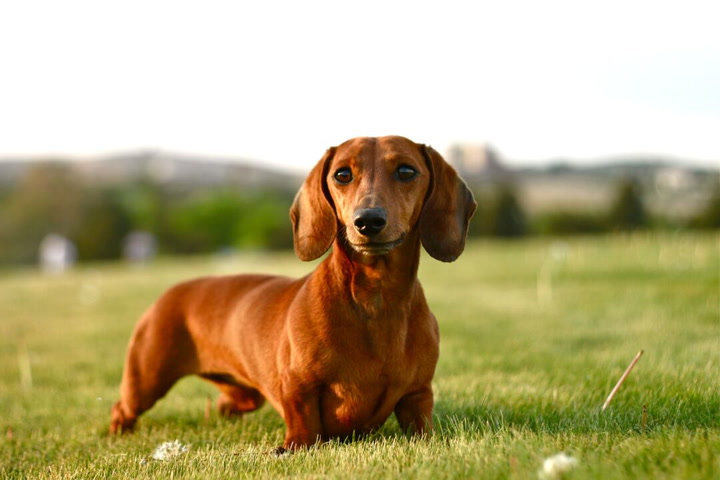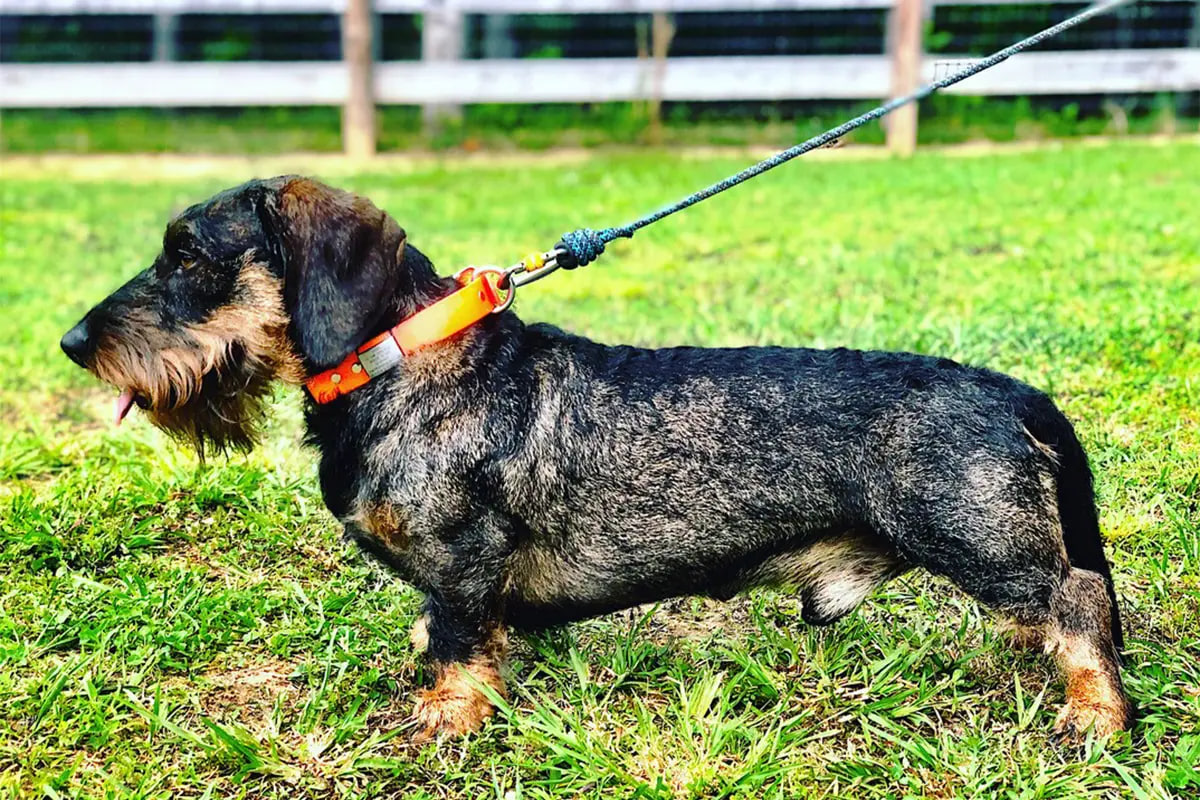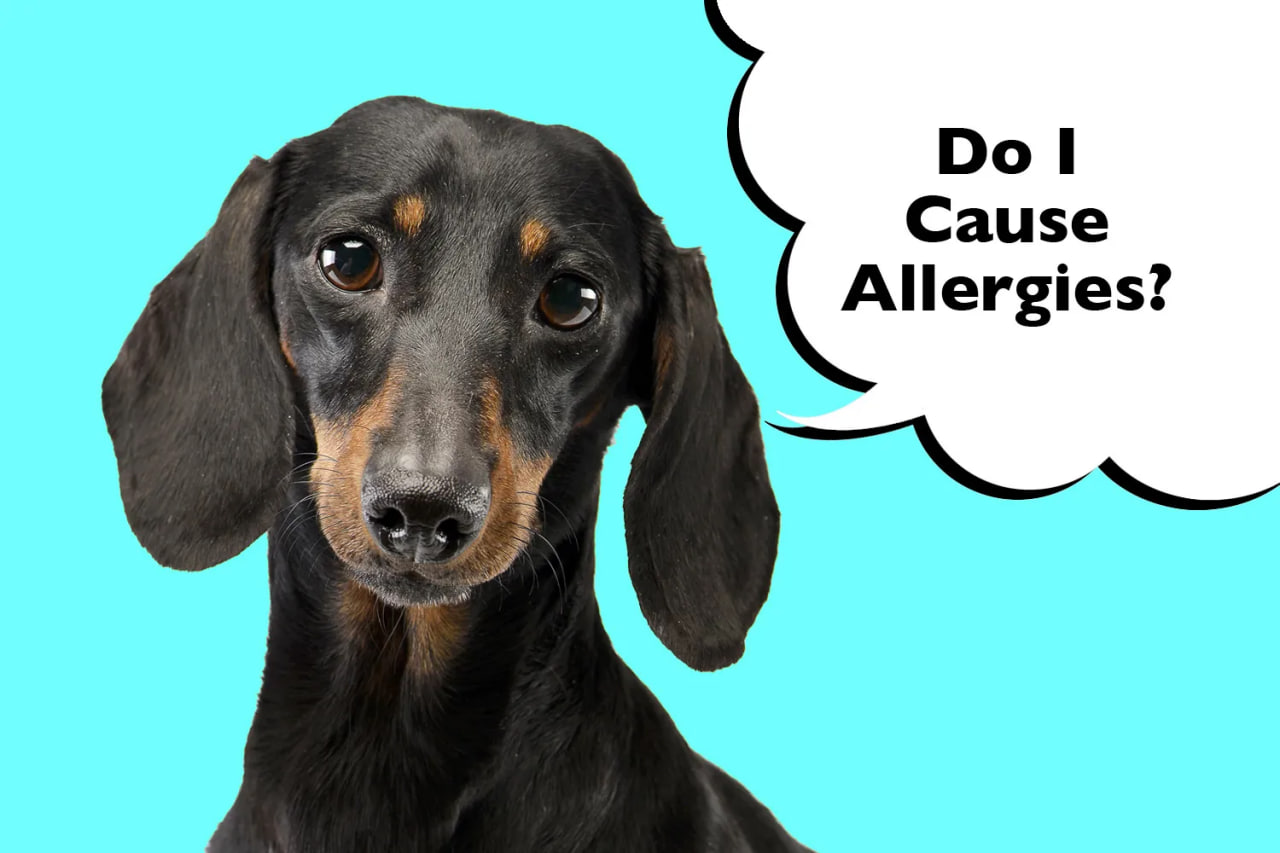Dachshunds are known for their unique long bodies and fun-loving personalities, but they are not considered hypoallergenic. This article examines the connection between Dachshunds and allergies, providing important details for potential owners who may be wondering, “Are Dachshunds Hypoallergenic?”
In the upcoming sections, we will explore the specifics of allergens related to Dachshunds, compare them to breeds that are hypoallergenic, and give practical advice on how to manage allergies. Whether you already own a Dachshund or are thinking about getting one, this guide will assist you in dealing with pet allergies effectively.

Are Dachshunds Hypoallergenic?
Many people who are considering getting a dog often wonder, “Are sausage dogs hypoallergenic?” To address this question, it’s essential to grasp the definition of hypoallergenic in relation to dogs.
Dachshunds are not considered hypoallergenic pets. Despite the term hypoallergenic implying that a dog won’t cause allergies, it’s crucial to recognize that all dogs produce allergens to varying extents.

Main Sources of Allergens in Dachshunds
Dachshunds, similar to other dogs, release allergens mainly through their dander (dead skin cells), saliva, and urine. These allergens can trigger responses in people who are sensitive, varying from slight discomfort to serious breathing problems.
How These Allergens Affect Individuals with Allergies
People who are prone to dog allergies may develop symptoms like sneezing, a runny nose, itchy eyes, and in more serious situations, asthma attacks when they come into contact with the allergen. The intensity of these reactions can differ based on the individual’s sensitivity level and the extent of exposure to the allergen.

Difference Between Shedding and Allergen Production
“Are Dachshunds Hypoallergenic?” Shedding and allergen production are connected but separate processes. Shedding is the natural process of losing hair, while allergen production involves the release of proteins from a dog’s skin cells, saliva, and urine. These allergens are consistently produced and not necessarily linked to the amount of visible hair a dog sheds. It is crucial to recognize this difference when considering whether dachshunds are hypoallergenic.
Dachshunds have three coat types, each with unique shedding behaviors that may impact individuals with allergies in various ways:
Smooth-coated
Dachshunds have a moderate shedding level all year round. Even though their shorter fur may not be as noticeable in the house, it’s essential to remember that short hair still contains allergens that can cause reactions in people who are sensitive to them.

Long-haired
As per the AKC breed standard, long-haired Dachshunds have smooth hair that is often slightly wavy and hangs long on their ears, neck, chest, legs, and belly. This type of Dachshund sheds moderately all year round, similar to the short-haired variety. However, the long-haired Dachshund’s fur needs more care. Regular brushing is essential to prevent knots and tangles, which can lead to increased contact with allergens. For owners with allergies, grooming may cause reactions, so it is advisable to wear masks and gloves while grooming to reduce exposure.

Wire-haired
Wire-haired Dachshunds have a unique double coat that results in heavy shedding in the spring and fall. The thick undercoat can trap allergens, which are released into the air when these dogs shed. This seasonal shedding can worsen allergy symptoms, so it’s important for owners to be diligent about grooming and cleaning during these times.
The spread of allergens due to shedding can be significant, as loose hair can carry allergens all around the house. Regular grooming and cleaning can help lessen this problem, but it’s important to understand that even minimal shedding can still contribute to allergen buildup. For those wondering if Dachshunds are hypoallergenic, knowing about their shedding patterns is crucial for effectively managing their living environment and reducing allergy symptoms.

Managing Allergies with Dachshunds
For individuals who are committed to having a Dachshund as a pet despite being allergic, there are various methods to reduce exposure to allergens.
Grooming Practices
Regular grooming is crucial for minimizing dander and shedding. It is recommended to brush your Dachshund at least 2-3 times per week to get rid of loose hair and dander. Giving them a bath once a month with a mild, dog-friendly shampoo can also assist in reducing dander levels. Be sure to consider their specific coat type, as long-haired and wire-haired Dachshunds may need more frequent grooming to avoid mats and tangles, which can worsen the spread of allergens.

Cleaning Habits
Keeping your home clean is very important for controlling allergies. Regularly vacuuming with a HEPA filter vacuum can help get rid of allergens from carpets, rugs, and furniture. Air purifiers are also useful in reducing airborne allergens like dander. To reduce exposure even more, you may want to prevent your Dachshund from getting on furniture and use washable, hypoallergenic covers where your dog likes to rest frequently.
Home Environment
It is important for people with allergies to create a home environment that reduces allergens. Consider using hypoallergenic bedding for both yourself and your Dachshund, and designate certain areas of your home as off-limits to your dog to minimize the spread of allergens. Regularly clean your dog’s bedding and toys, and ensure good ventilation in your home to lower allergen levels. These steps can greatly help in managing allergies while enjoying the company of your Dachshund.
In addition to managing allergies, providing proper nutrition is also essential for your Dachshund’s overall health and potentially reducing allergen production. A balanced diet can contribute to a healthier coat and skin, which may reduce dander. To learn more about the best nutrition for your Dachshund, refer to our guide on the Best Dog Food for Dachshunds. Selecting the right food can not only support your Dachshund’s well-being but may also indirectly assist in managing allergy symptoms.

Comparing Dachshunds with Hypoallergenic Breeds
It is important to compare Dachshunds with breeds known to be more suitable for people with allergies when determining if they are hypoallergenic. Despite being popular for their unique looks and lively nature, Dachshunds are not classified as hypoallergenic.
Low-Allergen Breeds
Certain types of dogs, like Poodles, Bichon Frises, and Portuguese Water Dogs, are frequently suggested for people with allergies because they have coats that shed less and produce less dander.
Dachshunds vs. Hypoallergenic Breeds
On the other hand, Dachshunds tend to produce more allergens because of their shedding patterns and dander production. They come in three coat varieties: smooth, long-haired, and wire-haired, each shedding differently but still releasing dander into the home. This can make Dachshunds less suitable for people with severe allergies compared to hypoallergenic breeds. However, it’s important to remember that individual reactions to allergens can differ. Some individuals with mild allergies may find that they can manage well with Dachshunds by grooming them properly and cleaning regularly to reduce dander. Nevertheless, those with severe allergies may still experience discomfort.

Tips for Allergy Sufferers
If you have allergies and are thinking about getting a Dachshund, here are some tips to consider:
Consulting an Allergist
Before you decide to get a Dachshund as a pet, it’s recommended to talk to an allergist first. They can offer tailored recommendations and might propose solutions such as immunotherapy to control your allergy symptoms.
Lifestyle Adjustments
Utilize tactics to minimize contact with allergens, like installing top-notch air filters, consistently tidying up your living space, and establishing areas in bedrooms where dogs are not allowed.
Choosing the Right Pet
For individuals with severe allergies, it might be a good idea to consider breeds that are more hypoallergenic or even non-canine pets that are less likely to cause allergic reactions. While allergies are an important factor to think about when selecting a Dachshund, it’s also crucial to understand other health issues that could impact this breed. Knowing about common diseases in Dachshunds can help you take better care of your pet and potentially reduce factors that could worsen allergies. To learn more about the specific health challenges that Dachshunds face and how to deal with them, we suggest reading our detailed guide on Common Diseases in Dachshunds. Being knowledgeable about these health issues will not only assist you in making an informed decision about owning a pet but also ensure that you are ready to provide the best care possible for your Dachshund, regardless of whether you have allergies or not.


